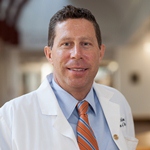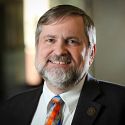Clinical, Translational and Implementation Science: Part 1 - CTSA renewal
Is this what unstoppable momentum feels like in research? Over the past six weeks, three large, high-impact research awards have been funded at UF Health: 1) Renewal of the NIH Clinical and Translational Science Award (CTSA) – $17.5 million over four years; 2) OneFlorida Clinical Data Research Network, a PCORnet research infrastructure funding award from the national Patient-Centered Outcomes Research Institute (PCORI) – $7.9 million over three years; and 3) “THE PRIORITIZE STUDY: A Pragmatic, Randomized Study of Oral Regimens for Hepatitis C,” a PCORI pragmatic trial – a $15.4 million research funding award over five years.
Although these grants represent a watershed moment in clinical, translational and implementation science at the University of Florida, they reflect foundational efforts that have been several years in the making. Indeed, these grants have their roots in areas of research excellence that have been in place at UF for many years, but which were accelerated over the past five years as part of our Forward Together strategic plan. To achieve balanced excellence across all fields of biomedical and population science, under Forward Together we committed to continued investment in basic research but with complementary investment in clinical and translational research. We recognized there was greater opportunity for large grants in the clinical and translational arena, which could be transformational for the institution.
This strategy indeed produced a notable set of achievements in research funding, facilities and academic structure. Research awards included the first CTSA grant (initial principal investigator Peter Stacpoole, M.D., Ph.D., followed by PI David Nelson, M.D.), large clinical research grants in aging (PI: Marco Pahor, M.D.), rehabilitation science (PI: Krista Vandenborne, Ph.D., P.T.), implementation science (PI: Elizabeth Shenkman, Ph.D.), and a major data coordinating center for the national Children’s Oncology Network (PI: Meenakshi Devidas, Ph.D.). New departments of biostatistics (Chair: Peihua Qiu, Ph.D.) and epidemiology (Chair: Linda Cottler, Ph.D., M.P.H.) were created across the College of Medicine and the College of Public Health and Health Professions. And to house much of this work, the 120,000-square-foot Clinical and Translational Research Building was constructed with a combination of a National Institutes of Health construction grant to the UF Institute on Aging (PI: Marco Pahor, M.D.) and other funds financed by the indirect cost recovery of grants awarded to faculty in the CTRB, including faculty in the departments of epidemiology and biostatistics, the CTSI, and a number of clinical research projects across several academic departments.
These efforts in clinical and translational research created momentum that is now continuing. In a recent issue of On the Same Page, for example, the establishment of an NIH Alzheimer’s Disease Research Center at UF was highlighted. UF was also awarded a clinical center grant from the NIH to study chronic pancreatitis and factors that increase the risk of pancreatic cancer (PIs: Chris Forsmark, M.D., Ken Cusi, M.D., and Steve Hughes, M.D.) and a Phase II clinical trial of a new vaccine for patients with medulloblastoma (PI: Duane Mitchell, M.D., Ph.D.). In addition, Krista Vandenborne, a professor and chair of the department of physical therapy in PHHP, received a $1.2 million renewal from NIH to continue her team’s studies of MRI to track Duchenne muscular dystrophy disease progression. And Lee Sweeney, Ph.D., a professor of pharmacology recruited from Penn as part of the preeminence initiative, received an award of $10.8 million from NIH to establish a Sen. Paul D. Wellstone Muscular Dystrophy Cooperative Research Center at UF.
Now, the addition of three large research awards in quick succession will no doubt contribute to another inflection point, as these grants will lead to much additional research with the potential to improve patient care and health outcomes for patients at UF Health, statewide and across the country. In an attempt to provide insight into the importance of these new grants, this issue of On the Same Page is the first of a three-part newsletter. This first part will summarize the CTSA grant renewal and its implications for UF; the subsequent two parts will describe, respectively, the PCORnet OneFlorida award (Co-PIs: Elizabeth Shenkman, Ph.D. and William Hogan, M.D., M.S.) and the PCORI pragmatic clinical trial on the treatment of hepatitis C (PI: Dave Nelson, M.D.).
Clinical and Translational Science Award (CTSA) Renewal
On Sept. 24, it was announced that UF’s second Clinical and Translational Science Award had been funded, with a grant of $17.5 million over four years to continue to pave the way for a swifter and more collaborative journey from research to improved health in the nation’s third largest state. This award reflected the efforts of the entire clinical and translational research community at UF, led by PI and UF Clinical and Translational Science Institute Director David Nelson, M.D., and CTSI Co-Director Elizabeth Shenkman, Ph.D.


As part of the main (U54) award, there are linked KL2 training grants directed at junior faculty (PI Thomas Pearson, M.D., Ph.D., M.P.H.) as well as TL1 training grants directed at doctoral students (PI Wayne McCormack, Ph.D.)


Background on CTSA
What exactly is the CTSA, and how does it help research at UF? Virtually all investigators involved in biomedical science are not only fascinated by the intrinsic scientific challenges of their work, but also would love to see the day when their innovations are translated into clinical tools that can better prevent, diagnose or treat human disease. Indeed, it is part of the mission of NIH to foster fundamental discoveries that “advance significantly the Nation’s capacity to protect and improve health,” … that “develop, maintain and renew scientific human and physical resources that will assure the Nation's capability to prevent disease,” … and that “expand the knowledge base in medical and associated sciences in order to enhance the Nation's economic well-being and ensure a continued high return on the public investment in research.”
Thus, while NIH is associated in most people’s minds with basic science research, the stated mission of NIH connects basic science discoveries with improvements in health, and with economic development. It is the connection between scientific discovery and improved health that is the focus of the CTSA. This includes technology and its commercialization, i.e., bringing new drugs and devices to clinical use. It also includes research on how recognized, efficacious practice can be better adapted in the community, and how best to develop a system of health-care delivery that maximizes health benefit at the least cost.
The national CTSA program is part of the legacy of former NIH Director Elias Zerhouni, M.D., who in 2003 launched the NIH “Roadmap for Medical Research.” (See Zerhouni E. Science 2003;302:63-72.) The NIH Roadmap, from which the CTSA program evolved, represented the NIH response to the question: “What novel approaches can be developed that have the potential to be truly transforming for human health?” (Zerhouni, E. NEJM 2005;353:1621-23)
Achievements Under the First CTSA, 2009-2014
In 2009, UF became the state’s first recipient of a Clinical and Translational Science Award and remains one of only two awardees in the state, with the University of Miami receiving a CTSA in 2012. The UF CTSI creates infrastructure for clinical and translational research, offers education and training programs for research teams, and provides services and resources to facilitate research, such as pilot funding, data tools and specialized facilities. To date, the CTSI has served more than 1,800 investigators across UF’s 16 colleges. An economic impact analysis completed in 2013 found that every $1 of UF CTSI operating expenditures helped spur an additional $11 in external funding awards, with total spending on CTSI operations supporting an estimated $1.1 billion in economic activity in Florida.
During the initial award, UF CTSI programs developed new methods and technologies in areas including biostatistics, epidemiology, community engagement and health outcomes research. CTSI-supported research teams made significant advances along the full continuum of translational research — from preclinical to clinical to population health sciences — in areas as diverse as mucosal immunology, precision medicine, gene therapy, rare and infectious diseases, aging and pediatric diseases, including type 1 diabetes and muscular dystrophy. CTSI programs spurred multidisciplinary preeminence initiatives in metabolomics, genomic medicine, biomedical informatics, translational communication research and social network analysis.
Early under Dr. Nelson’s leadership, the CTSI embraced the concept of a learning health system by embedding translational science throughout UF to support a continuous cycle of inquiry, innovation and implementation. The CTSI and UF Health laid the groundwork for a cohesive learning health system by integrating clinical and research data, creating new connections between patients and research opportunities, and developing programs and expertise to embed science in practice. In recognition of the CTSI’s accomplishments at UF, Dr. Nelson was awarded the 2014 Learning Health System Champion Award by the Association of American Medical Colleges.
In 2010, the CTSI strengthened its collaboration, community engagement and integration of health care and research by forming a partnership with the Florida State University College of Medicine and its unique community-based medical education model — which has more than 2,500 faculty physicians practicing in six regions across the state — to create Health IMPACTS, a statewide practice-based research network. Health IMPACTS engaged community-based clinicians and their patients in translational research, particularly pragmatic clinical trials and implementation science studies. Health IMPACTS formed the foundation for and later transitioned to become part of the OneFlorida Clinical Research Consortium.
In 2011, the CTSI established resources to facilitate community-engaged research, including community-based pilot awards, a Community Advisory Board and community research associates. Dr. Linda Cottler expanded her long-standing and successful HealthStreet program at UF when she joined the university in 2011 as founding chair and professor of epidemiology. HealthStreet’s community health workers connect underrepresented individuals with opportunities to participate in research as well as medical and social services. HealthStreet also serves as a venue for investigators across UF who wish to have community input into their study design, consent process and questionnaires.
During this time, the CTSI also developed infrastructure to link researchers to clinical data, biospecimens and patients. The centerpiece of this capability is the Integrated Data Repository, or IDR, which the CTSI and UF Health created in 2011 to organize institutional data to support improved care and research. The IDR consists of a secure, clinical data warehouse that aggregates data from the university’s inpatient and outpatient clinical and administrative information systems, including the UF Health EpicCare electronic health record system. The IDR makes a de-identified and HIPAA-compliant limited data set available to researchers via the NIH-funded Informatics for Integrating Biology and the Bedside (i2b2) platform. Researchers can use i2b2 to identify cohort counts for grant proposals, clinical trials and IRB protocols. Researchers can also apply for IRB approval to obtain de-identified research data sets, which may be used for answering additional study feasibility questions and conducting retrospective studies. The IDR has already been used by clinicians to publish more than 70 papers — on topics including postoperative vision loss, development of machine learning classification models that predict postoperative pain, and analysis of risk, cost and mortality for postoperative acute kidney injury — and has led to more than $10 million in extramural grant funding.
In 2012, Julie Johnson, Pharm.D., dean of the UF College of Pharmacy, led the creation of the CTSI’s UF Health Personalized Medicine Program to find ways to use genetic information as a routine part of patient care. Successful program elements included collaborating with UF Health Pathology Laboratories to create an easily orderable and locally run clinical laboratory test, reporting genotype and phenotype data with simple interpretations into the electronic health record for direct use by clinicians, along with clinical decision support within the electronic health record that facilitates drug changes and guides clinicians during future patient encounters. In July 2013, the CTSI program became part of the NIH-funded Implementing Genomics in Practice (IGNITE) Network, which is funding the program’s ongoing expansion at UF Health and in community-based health care settings throughout the state.
Also in 2012, the CTSI launched Consent2Share, an initiative that offer patients treated at UF Health an opportunity to allow UF researchers to contact them about future research studies for which they might be eligible. Patients are invited to participate when they check in for their appointments, and consent is recorded in the IDR. Gigi Lipori, chief data officer for UF Health, oversees the IDR and works closely with Dr. Peter Iafrate, chair of the UF IRB, to manage the IDR’s honest broker process and oversee quality assurance for the Consent2Share initiative. To date, more than 21,500 patients have agreed to participate in Consent2Share. With IRB approval, more than 4,000 patients who consented for re-contact have been linked to clinical research teams through the IDR’s honest broker process.
The CTSI’s Southeast Center for Integrated Metabolomics (SECIM) launched in September 2013 with a five-year, $9 million grant from the NIH Common Fund’s Metabolomics Program. SECIM is one of six regional centers supported by the NIH Common Fund to spur metabolomics research in the United States. SECIM brings together expertise and resources from multiple colleges and units at UF as well as Sanford-Burnham Medical Research Institute, the National High Magnetic Field Laboratory at Florida State University, the Ohio State University, the University of Georgia, Imperial College London, the University of Geneva and industry partners IROA Technologies and Thermo Fisher Scientific. SECIM is developing an integrated metabolomics service to provide high-quality data, user-friendly statistical analysis tools, training and pilot funding for clinical and basic metabolomics studies.
Recognizing the need to engage health care providers and patients outside UF Health’s academic setting, the CTSI led development of the OneFlorida Clinical Research Consortium; this consortium led to the PCORnet grant that will be highlighted in Part 2 next week.
Plans for the CTSA, 2015-2019
The mission of the UF CTSI is to improve human health by accelerating the translation of scientific discoveries and the implementation of evidence-based best practices for the diagnosis, treatment, prevention and cure of human disease. By connecting resources, people and ideas, under the grant renewal the CTSI will expand collaboration and advance translational research across UF’s 16 colleges. In addition, the UF CTSI will lead further development of the OneFlorida consortium and a research agenda that emphasizes the health priorities and diversity of Florida’s 20 million people. The institute will chart new pathways for translational workforce development, embed translational science in learning health systems and physician practices, and accelerate the collective impact of the national CTSA network and the research it supports through the development of new capabilities for participant recruitment, multisite studies, clinical metabolomics and network science.
Within UF Health, the CTSI will expand its work at the intersection of research and patient care. The CTSI’s 14,000-square-foot Clinical Research Center will serve UF’s growing portfolio of clinical trials involving participants across the lifespan. In tandem, the CTSI will partner with UF’s health system and FSU to integrate evidence-based health interventions into clinical practice. The CTSI also will expand UF Health’s Consent2Share program, described previously, and develop advanced data capabilities that support the entire data lifecycle in translational science.
Also, to meet the growing demand for a workforce with the skills to lead and contribute to translational team science in a variety of environments, the CTSI will reshape how it supports development of careers in science. The CTSI will provide students and scholars an opportunity to explore career tracks not just in academic medicine, but also in community engagement and clinical research navigation, industrial biotechnology, technology transfer and entrepreneurship, research education and outreach, and regulatory science and government. As part of an expanded CTSI Translational Workforce Development Program led by Dr. Pearson and a nine-member directorate of education leaders, the CTSI will offer career development and training grants for junior faculty (KL2) and Ph.D. students (TL1). The CTSI also will develop new “T Team” and “K College” concepts to support and convene all K and T scholars at UF, thereby serving as a hub that enhances team science and translational research training across colleges through an integrated portfolio of educational development, diversity, mentoring and professional development programs.
Institutional support from UF’s Office of Research, led by David Norton, Ph.D., as well as from the College of Medicine and Health Science Center, more than doubles the resources available for the CTSI’s efforts, reflecting its role as a research hub that mobilizes teams and engages participants across the university, state and nation.
In creating the CTSA program at NIH in 2005, Dr. Zerhouni stated: “It is our intention and hope that this focused and significant commitment to the creation of a new, vital and reinforced academic discipline and home for translational and clinical science — along with an explicit effort to maximize the effectiveness of NIH resources directed to this area of research — will ensure that extraordinary scientific advances of the past decade will be rapidly captured, translated and disseminated for the benefit of all Americans.” Under the CTSI’s leadership of Drs. Nelson and Shenkman, whose dogged determination and inspiring creativity have galvanized our clinical and translational research community, this vision has been embraced at UF and is being translated into reality.
The Power of Together,
David S. Guzick, M.D., Ph.D. UF Senior Vice President for Health Affairs & UF Health President
About the author
